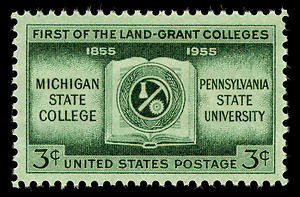At 150, land-grant public universities struggle to return to roots
These circumstances may evoke the present day, but they were actually the backdrop to the little-known but hugely influential innovation 150 years ago that gave rise to dozens of America’s best-known public universities as a way of expanding higher education to the working class.
The anniversary of the Morrill Act, establishing more than 70 so-called “land-grant” universities—including some of America’s biggest and best known—comes just as advocates are warning that cuts in support, and resulting tuition increases, threaten the ideal of broad access to U.S. public universities.
“We’re in danger of chipping away at the effectiveness of the commitment to access and affordability to higher

